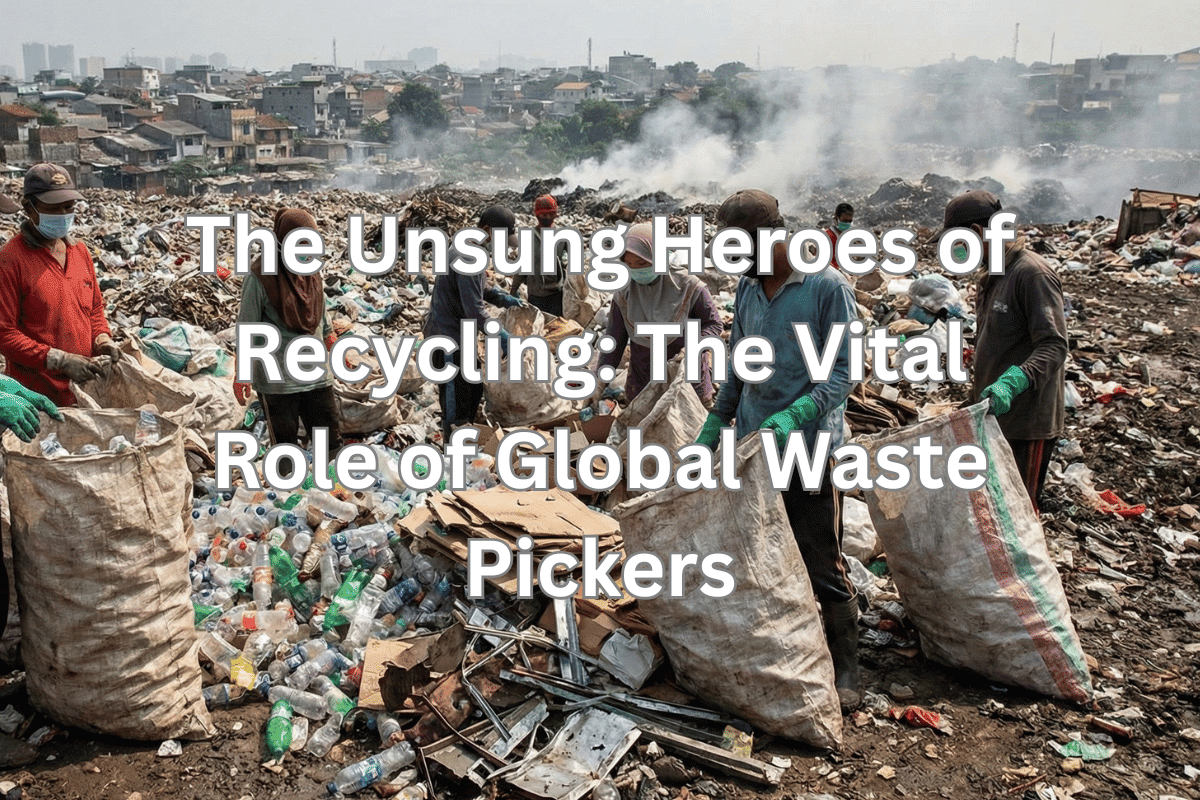As someone who has lived and worked in Asia, I have witnessed firsthand the incredible yet often overlooked contributions of waste pickers, especially women, to our society.
Waste pickers are individuals who collect and sort through garbage to recover recyclable materials such as cans, paper, and plastic. These individuals are often dismissed or ignored, seen as part of a “lower class” or simply scavengers. However, when we take a closer look at their work, it becomes clear that waste pickers play a critical role in our communities and deserve recognition for their efforts.
Table of Contents
- The Reality of Waste Management in Asia
- Waste Pickers as Unofficial Recyclers
- The Challenges Faced by Waste Pickers
- Waste Pickers and the Informal Economy
- Why We Should Admire Waste Pickers
- How We Can Support Waste Pickers
- Deep Dive Podcast
- Related Questions
In many parts of Asia, unlike in countries such as the United States or other developed nations, formal recycling programs are either minimal or nonexistent. In these regions, waste pickers essentially function as the backbone of the recycling system, performing an essential service that benefits the environment, the economy, and society as a whole.
Read on as we will explore the vital role waste pickers play, the challenges they face, and why we should admire and support them for their invaluable contributions.
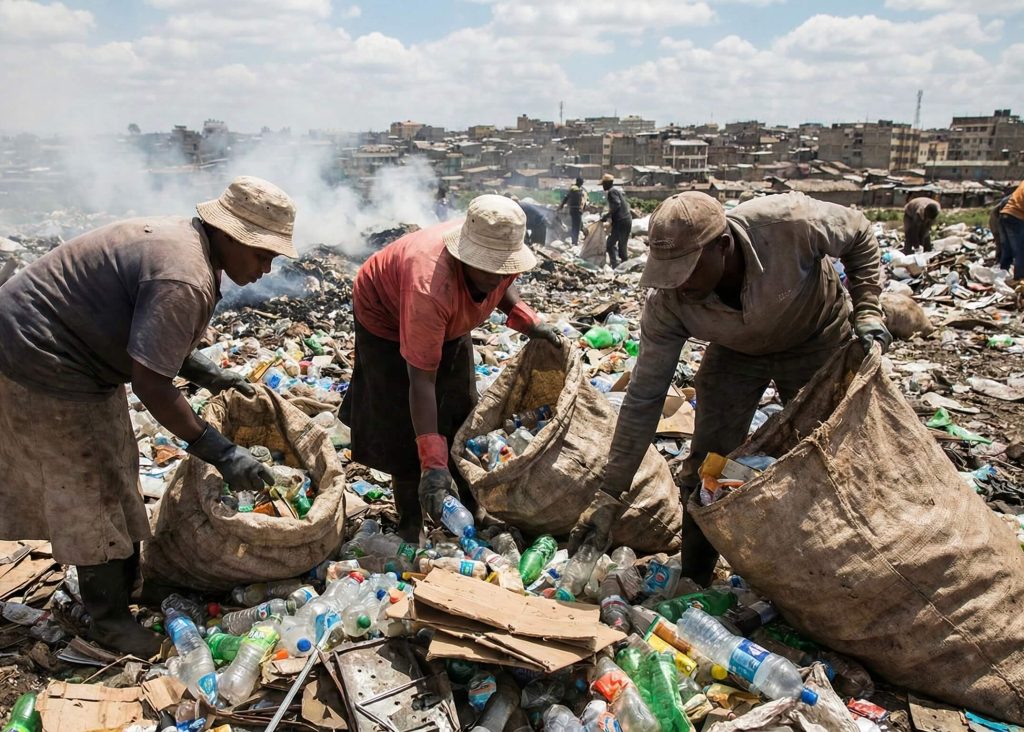
The Reality of Waste Management in Asia
In much of Asia, waste management operates very differently from the systems in Western countries. In places like the United States, households are often required to separate recyclables—such as paper, plastic, and cans—into designated bins, which are then collected by municipal or private recycling services.
However, in many Asian countries, all types of waste are typically thrown together into a single bin or bag, with little to no sorting done at the source.
This is where waste pickers step in. They sort through piles of mixed garbage, often in unsanitary and hazardous conditions, to recover recyclable materials.
These materials are then cleaned, bundled, and sold to small recycling shops or scrap dealers, who further process them for reuse. Without waste pickers, much of this recyclable material would end up in landfills or incinerators, contributing to pollution and environmental degradation.
Waste Pickers as Unofficial Recyclers
Waste pickers play a crucial role in recycling, especially in countries where formal recycling systems are underdeveloped.
They are, in essence, the “unofficial recyclers” of society, ensuring that valuable materials are recovered and reused rather than wasted. Here are some of the ways waste pickers contribute to their communities:

1. Reducing Waste in Landfills
By recovering recyclable materials from mixed garbage, waste pickers significantly reduce the volume of waste that ends up in landfills. Landfills are not only unsightly but also harmful to the environment, as they release methane gas, a potent greenhouse gas, and leach toxic substances into the soil and groundwater.
Waste pickers help mitigate these environmental impacts by diverting materials like plastic, metal, and paper away from landfills.
2. Conserving Resources
The materials recovered by waste pickers are often sent to recycling facilities, where they are processed and reused to manufacture new products. This reduces the demand for virgin resources such as timber, petroleum, and minerals, which are needed to produce paper, plastic, and metal products.
By enabling the reuse of materials, waste pickers contribute to resource conservation and environmental sustainability.
3. Providing a Source of Income
For many waste pickers, collecting and selling recyclable materials is their primary source of income. While the work is physically demanding and often poorly paid, it provides a livelihood for millions of people, particularly in urban areas where formal employment opportunities may be scarce.
Waste pickers are part of the informal economy, which encompasses all economic activities and jobs that operate outside formal legal and regulatory frameworks.
4. Supporting Local Recycling Businesses
In many parts of Asia, small recycling shops and scrap dealers rely on waste pickers to supply them with raw materials.
These businesses, in turn, process and sell the materials to manufacturers, creating a circular economy that benefits the local community. Waste pickers are a vital link in this chain, enabling the recycling industry to thrive.
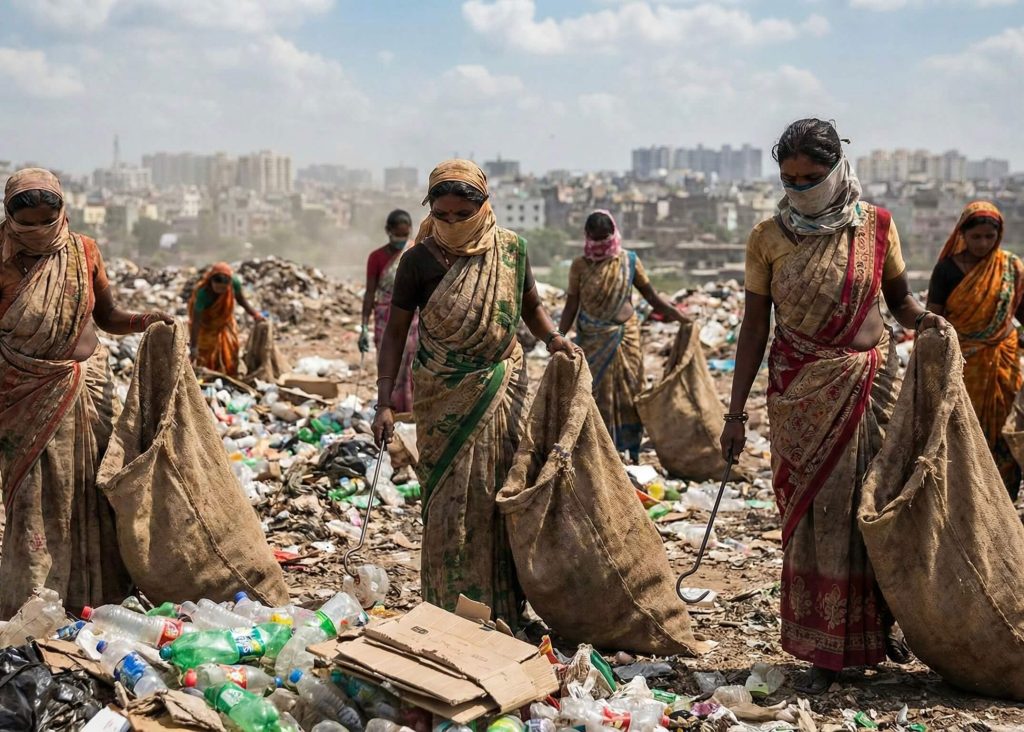
The Challenges Faced by Waste Pickers
Despite their important contributions, waste pickers face numerous challenges that make their work difficult and precarious. These challenges highlight the need for greater recognition and support for this vulnerable group:
1. Lack of Legal Protections
Waste pickers operate in the informal economy, which means they are not covered by labor laws or social protections. They do not have access to benefits such as health insurance, retirement savings, or paid leave, leaving them vulnerable to exploitation and financial insecurity.
2. Health and Safety Risks
Sorting through garbage is a hazardous job. Waste pickers are exposed to sharp objects, toxic chemicals, and harmful pathogens, often without adequate protective equipment. They are at high risk of injuries, infections, and chronic illnesses, yet they rarely have access to healthcare services.
3. Social Stigma
Waste pickers are often marginalized and stigmatized by society, viewed as “dirty” or “low-class” because of the nature of their work. This social stigma can lead to discrimination and exclusion, further isolating waste pickers from opportunities and resources.
4. Economic Vulnerability
The income of waste pickers is highly unpredictable, as it depends on the fluctuating market prices of recyclable materials. When prices drop, waste pickers may struggle to make ends meet. Additionally, they often face competition from formal waste management companies, which can threaten their livelihoods.
5. Lack of Recognition
Despite their significant contributions to recycling and waste management, waste pickers are rarely recognized or appreciated for their work. Their efforts are often invisible to the broader public, and they are excluded from policy discussions and decision-making processes related to waste management.
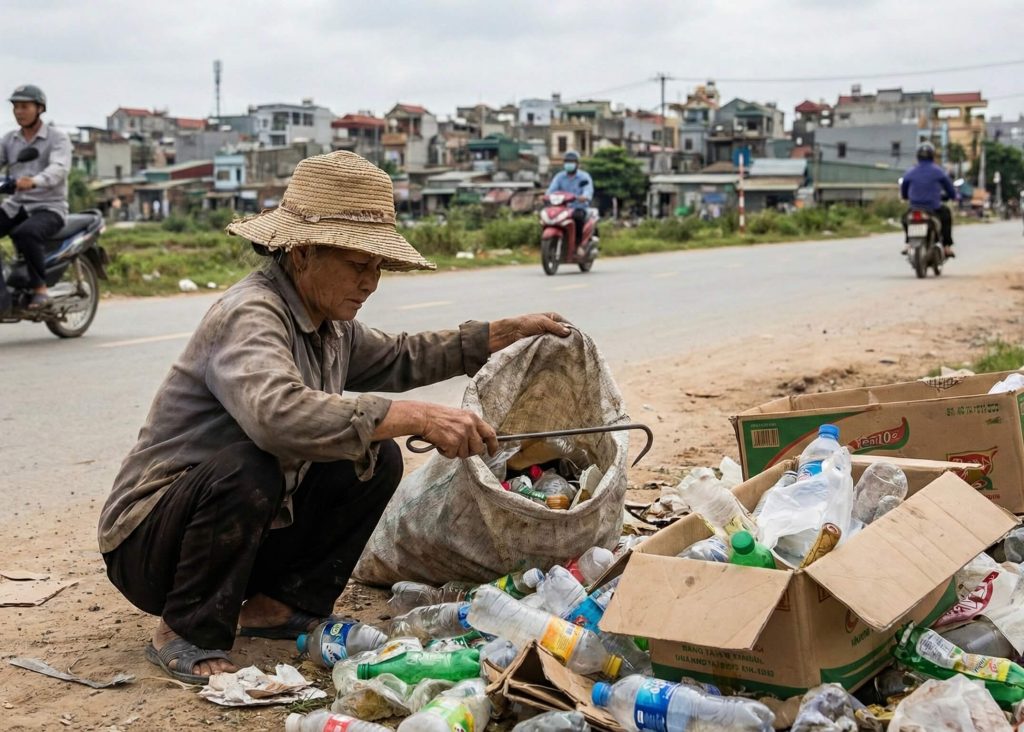
Waste Pickers and the Informal Economy
Waste pickers are a prime example of workers in the informal economy, which encompasses all economic activities, enterprises, and jobs that are not covered by formal arrangements. The informal economy is a massive sector, accounting for over 60% of the global workforce. In low-income countries, this figure rises to as high as 90%.
Unlike formal workers, who are employed by registered companies and receive benefits such as health insurance and pensions, informal workers operate without such protections. This makes them highly vulnerable to exploitation, poverty, and economic shocks.
Waste pickers, in particular, are among the most marginalized groups within the informal economy, yet their work is essential to the functioning of society.
Why We Should Admire Waste Pickers
Given the challenges they face and the important role they play, waste pickers deserve our admiration and support. Here are some reasons why we should appreciate their work:
1. Environmental Impact
Waste pickers are on the front lines of the fight against pollution and climate change. By recovering and recycling materials, they help reduce waste, conserve resources, and lower greenhouse gas emissions. Their work is essential to creating a more sustainable and circular economy.
2. Economic Contribution
Waste pickers contribute to the economy by supplying raw materials to recycling businesses and reducing the costs of waste management for municipalities. They are an integral part of the informal economy, which provides livelihoods for millions of people worldwide.
3. Resilience and Resourcefulness
Waste pickers demonstrate incredible resilience and resourcefulness in the face of adversity. Despite the physical demands and social stigma of their work, they find ways to support themselves and their families, often in the absence of formal employment opportunities.
4. Social Equity
By recognizing and supporting waste pickers, we can promote greater social equity and inclusion. Waste pickers are often among the most marginalized members of society, and acknowledging their contributions is a step toward addressing systemic inequalities.
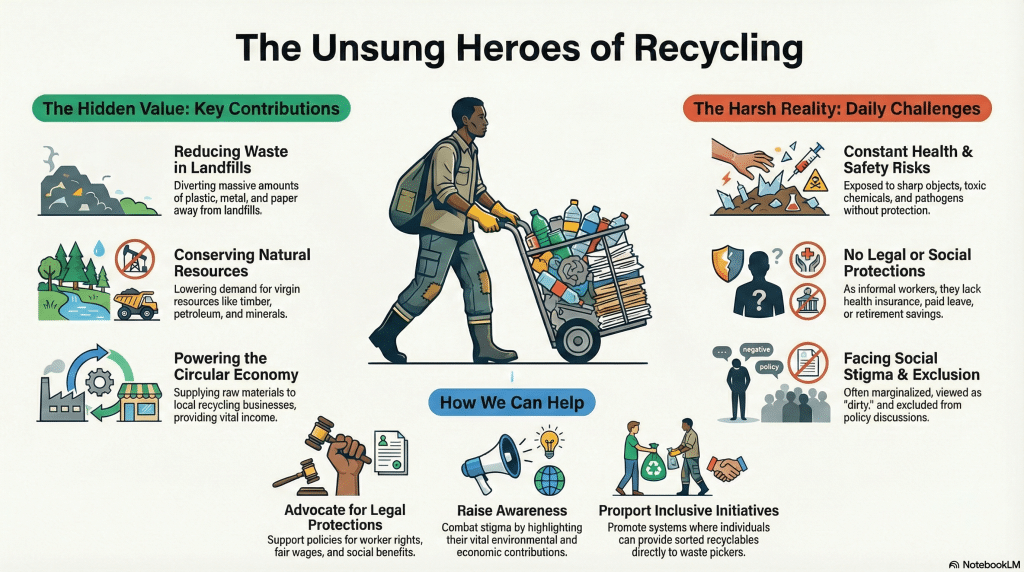
How We Can Support Waste Pickers
To support waste pickers and ensure they receive the recognition and resources they deserve, we can take the following steps:
1. Advocate for Legal Protections
Governments should create legal frameworks that recognize and protect waste pickers as workers. This includes granting them access to social protections, such as health insurance and pensions, and ensuring fair wages and working conditions.
2. Promote Inclusive Policies
Waste pickers should be included in policy discussions and decision-making processes related to waste management and recycling. Their expertise and experience are invaluable to creating effective and equitable systems.
3. Provide Access to Resources
Non-governmental organizations (NGOs), businesses, and governments can provide waste pickers with access to resources such as protective equipment, training, and financial services. This can help improve their safety, productivity, and economic stability.
4. Raise Awareness
Public awareness campaigns can help reduce the stigma associated with waste picking and highlight the important contributions of waste pickers to society. By changing perceptions, we can foster greater appreciation and support for their work.
5. Support Recycling Initiatives
Individuals can support waste pickers by separating recyclables from their household waste and providing these materials directly to waste pickers. This simple act can make their work easier and more efficient.
Waste pickers are the unsung heroes of recycling, playing a vital role in waste management, environmental sustainability, and the informal economy.
Despite facing significant challenges, they continue to make invaluable contributions to society, often without recognition or support. It is time for us to acknowledge their efforts, advocate for their rights, and work toward a more inclusive and equitable system that values their contributions. By supporting waste pickers, we can create a cleaner, greener, and fairer world for everyone.
Deep Dive Podcast
Learn more with our Deep Dive Podcast.
At A Bus On A Dusty Road, we talk about travel, life, and ex-pat living. We are all about “Living Life As A Global Citizen.” We explore social, cultural, and economic issues and travel.
We would love to have you be part of our community. Sign up for our newsletter to keep up-to-date by clicking here. If you have any questions, you can contact me, Anita, by clicking here.
Listen to our Podcast called Dusty Roads. You can find it on all major podcast platforms. Try out listening to one of our podcasts by clicking here.
Subscribe to our A Bus On A Dusty Road YouTube Channel with great videos and information by clicking here.
Related Questions
How Do I Start A Home-based Art Business?
If you are considering starting a home-based art business, you should first try to understand your goals in starting your business. It would be best if you also were sure that you have a place in your home to operate your business and mainly to produce the required artwork. But, all of this will not matter if you are not producing high-quality artwork consistently.
You can find out more about how to start up a home-based art business by reading the blog Planning to Start A Home-based Art Business, What To Consider by clicking here.
Do I Need To Have a Website?
We recommend that anyone looking to have a business also consider having a website, especially if you need it to help you get more business. There may be some businesses where you do not need to have a website, but we find that a website can help you look professional. Also, a good website can give you credibility.
For some ideas on why having a website is good, you can read the blog 11 Reasons Every Artist Should Have a Website by clicking here.

